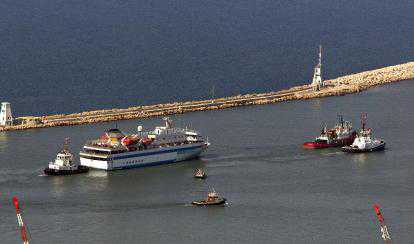The Emir of Qatar, Sheikh Hamad bin Khalifa al-Thani, paid a two day visit to Turkey on August 17-18, as the guest of Turkish President Abdullah Gul. They both signed several agreements aimed at improving bilateral relations, including promoting closer cooperation on energy issues.
On August 17, Gul and al-Thani met in Istanbul. The Turkish and Qatari delegations held working meetings during the day, discussing regional issues as well as bilateral cooperation. The first bilateral agreement signed involved a protocol concerning regulating labor issues between the two countries. The second agreement was inked between Turkish Radio and Television Corporation and Qatar’s State Television to enhance broadcasting cooperation. The parties also signed a memorandum of understanding on waiving visa requirements for their citizens (Cihan, August 17).
During the press briefing, Gul emphasized that the high-level delegation accompanying al-Thani indicated the importance that Qatar attaches to Turkey. He noted that economic cooperation was the most important aspect of bilateral ties and highlighted Qatar’s help in facilitating Turkey’s relations with other members of the Gulf Cooperation Council. Gul also referred to Qatar’s constructive role in regional affairs and praised his counterpart’s efforts to mediate over regional problems. He reiterated that Turkey and Qatar held similar positions on many issues, and that they had worked together to promote regional peace. Al-Thani also highlighted their growing bilateral ties and expressed his determination to further develop this relationship. Moreover, he acknowledged Turkey’s role in regional policies, and his gratitude toward Ankara for its position on the Palestinian issue (www.tcbb.gov.tr, August 17).
The annual trade volume between both countries remains low at $1.5 billion. However, Qatar is an important destination for Turkish contractors and its companies have undertaken multi-billion dollar projects there. Realizing the great potential created by Qatar’s infrastructure investments and its expanding economy, the Turkish private sector wants to further penetrate this market. The Istanbul Chamber of Commerce (ITO) recently announced that as part of their “Gulf Expansion” project, they will hold a major Turkish export fair in Qatar in September (Hurriyet Daily News, July 26). Turkey is also eager to attract investments from Qatar to boost its own economic development, as part of its broader attempt to turn the country into a major destination for Persian Gulf capital (EDM, February 5).
Reflecting these interests, on the second day of his trip Gul and al-Thani attended a working breakfast of the Turkish-Qatar Business Council, hosted by Turkey’s Union of Chambers and Commodity Exchanges (TOBB) and the Foreign Economic Relations Board (DEIK). Gul and the AKP government have proven instrumental in developing closer ties with Qatar and have promoted the flow of Qatari capital in Turkey, thanks partly to their personal ties. However, some of these business transactions were the subject of domestic political discussions. The joint-ventures between Qatari firms and businessmen close to the Turkish government continue to be a major source of criticism (Milliyet, May 1, 2008).
The parties announced that they will set up a Turkey-Qatar Joint Energy Working Group. Gul said that they discussed the feasibility of gas pipelines, storage facilities and refineries, as well as meeting Turkey’s liquefied natural gas (LNG) needs. Gul invited Qatar to invest in the storage facilities in Turkey’s Mediterranean port of Ceyhan, which is the terminus of the Baku-Tbilisi-Ceyhan pipeline and the planned Samsun-Ceyhan pipeline. Ankara has actively promoted Ceyhan as a global energy terminal, and al-Thani responded to this offer with great enthusiasm (Vatan, August 18).
Al-Thani also added that he hopes to see a “pipeline” running from Qatar to Turkey, and that the feasibility work on that project will continue. It was unclear, however, whether it would be a natural gas or crude pipeline, and what route it would follow.
Prior to the visit, Turkish Energy and Natural Resources Minister Taner Yildiz had publicized the “natural gas” dimension of the bilateral meeting. Yildiz said that talks were underway with Qatar concerning importing LNG. Yildiz noted that his contacts with Qatar are part of a broader Turkish effort to diversify its energy suppliers and supply routes. He said that if the parties could reach a consensus, Turkey might import around 4 billion cubic meters (bcm) of LNG annually from Qatar (Anadolu Ajansi, August 16). He also added that he hoped to sign a declaration on LNG imports during the visit of the Qatari delegation, yet following the meetings no official announcement was made to that effect.
Qatar is believed to possess the third largest gas reserves in the world, behind Russia and Iran. It is also a leading supplier of LNG and Turkey wants to develop cooperation with Qatar in natural gas projects. In July Qatar was represented during the signing ceremony of the E.U.-backed Nabucco pipeline and Prime Minister Recep Tayyip Erdogan maintained that Nabucco might tap into Qatar’s gas in the future (EDM, July 14).
Ankara has attempted to import Qatari LNG for its domestic needs for some time. During Gul’s February 2008 and Erdogan’s April 2008 visits to Qatar, energy was an important item on their agendas. They raised the issue of LNG imports, and the negotiations on this have continued since (Hurriyet, February 5, 2008; ANKA, April 15, 2008).
As a country heavily dependent on importing natural gas, Turkey meets its needs primarily through pipelines from Russia, Iran and Azerbaijan. It also has contracts with Algeria and Nigeria to import 4 bcm and 1.2 bcm of LNG annually, respectively. However, during the heavier winters, or when there are supply disruptions caused by the problems mainly encountered with Iran, Turkey is forced to buy LNG on spot markets. Since it lacks major natural gas storage facilities, such seasonal fluctuations result in the payment of higher sums for energy bills (Radikal, August 17). Therefore, Ankara is considering expanding the country’s storage capacity and importing larger amounts of LNG through long-term contracts, which might help it avoid such problems in the future.
https://jamestown.org/program/turkey-seeks-closer-energy-partnership-and-lng-contract-with-qatar/



